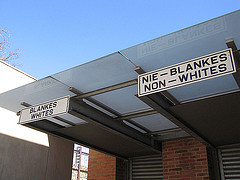Could Foucault’s notion of discourse give one a purchase on South African politics? Indeed, it can, specifically by clarifying the relationship between ANCYL leader Julius Malema and the parent body of the ANC. For Foucault, after the student protests of 1968 one could no longer really believe in the kind of (Althusserian) structuralist Marxist science […]
Bert Olivier
As an undergraduate student, Bert Olivier discovered Philosophy more or less by accident, but has never regretted it. Because Bert knew very little, Philosophy turned out to be right up his alley, as it were, because of Socrates's teaching, that the only thing we know with certainty, is how little we know. Armed with this 'docta ignorantia', Bert set out to teach students the value of questioning, and even found out that one could write cogently about it, which he did during the 1980s and '90s on a variety of subjects, including an opposition to apartheid. In addition to Philosophy, he has been teaching and writing on his other great loves, namely, nature, culture, the arts, architecture and literature. In the face of the many irrational actions on the part of people, and wanting to understand these, later on he branched out into Psychoanalysis and Social Theory as well, and because Philosophy cultivates in one a strong sense of justice, he has more recently been harnessing what little knowledge he has in intellectual opposition to the injustices brought about by the dominant economic system today, to wit, neoliberal capitalism. His motto is taken from Immanuel Kant's work: 'Sapere aude!' ('Dare to think for yourself!') In 2012 Nelson Mandela Metropolitan University conferred a Distinguished Professorship on him. Bert is attached to the University of the Free State as Honorary Professor of Philosophy.
Can one be autonomous in Foucault’s ‘carceral’ society?
Is it possible for individuals to be autonomous today, when evidence suggests that the vast majority simply fall in step, like goose-stepping stormtroopers, with the latest techno-fashions which, in turn, function like sugar-coated pills to lull people into passive, Matrix-like, politically impotent behaviour in front of their PCs or with their iPhones in hand? But […]
The importance of teaching Foucault in a time of conformism
Every time I teach a course on that inimitable “archaeological” and simultaneously “genealogical” thinker Michel Foucault I realise how important it is for students to be exposed to, and engage with, his unique mode of transformative thinking and praxis, or perhaps, thinking AS praxis. For make no mistake, to discover Foucault as a philosopher is […]
Education in a world of forgetting
How does one conceptualise the contemporary educational terrain regarding the challenges it faces in the new century, especially in so far as it is inescapably situated within the broader cultural landscape of 21st-century globalised society? The first thing one should note is that what the Frankfurt School called “technical rationality” is still being given priority […]
On shame, apartheid, and being a white South African
We live in a constitutional democracy, where, apart from the high levels of crime, the co-existence of people of various races is relatively peaceful, judging by my everyday experiences at the university where I teach, in restaurants and coffee shops, and also on occasion at civic functions. I attended such a function tonight at Port […]
How do we heal Earth?
Is there a connection between the exploitation of Earth – in the guise of her so-called “resources” – and capitalism? And, given the age-old conception of Earth as female, or the “Great Mother” (associated with the Goddess of hunter-gatherer times), is there a link between the rise and dominance of patriarchy and this veritable “assault” […]
Is capitalism destroying our planet? (3)
*What is therefore new in Kovel’s book (The Enemy of Nature), in contrast to the many books devoted to the ecological crisis today, is the sustained manner in which he connects all the obvious signs of environmental degradation and ecosystemic breakdown with the social order or system referred to above. Thomas Berry (in The Great […]
Is capitalism destroying our planet? (2)
Throughout this paper* I have used the term “capital” broadly in accordance with Marxist usage to denote the process by which money (as signifier of capital) endlessly reproduces itself, that is, the dynamism at the heart of this process. “Capitalism”, on the other hand, is the mode of social being, or kind of society which […]
Is capitalism destroying our planet?
Before answering this question, it is necessary to give some attention to the widely agreed upon evidence that it has been happening for some time, and, moreover, has accelerated. It is hard to know where to start and where to end when it comes to listing relevant “evidence” in this regard, even if there is […]
Technology, selective globalisation and control
How prominently does “technology transfer” to developing nations feature in the programme of globalisation? And what impact does it have outside of the West? In the book I have been discussing (Globalization, Technology and Philosophy, edited by Tabachnick and Koivukoski) Trish Glazebrook investigates these questions in light of what she perceives as a puzzling lack […]
Inside the machine – taking stock of technology today
In an essay titled “Looking backward, looking forward” — in the volume, Globalisation, Technology and Philosophy (Tabachnik and Koivukoski, editors; SUNY, 2004) — Andrew Feenberg takes stock of where humanity has come from, where we are now, and where we are heading in an increasingly technologised environment. He compares two important, but divergent novels, both […]
Germain, Baudrillard and Virilio on technology
I recently came across a wonderful essay by Gilbert Germain — in a book entitled Globalisation, technology and philosophy — on “the human condition in the age of technology”, where he takes a serious look at the reflections of Jean Baudrillard and Paul Virilio on contemporary technology. What immediately caught my eye is the striking […]

